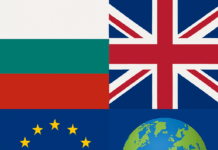By Rumy Vakarelska
Last week, Nigel Farage, the UKIP’s leader, sat as one of the panelists on Question Times’ latest edition together with UK MPs, comedian and campaigner Russell Brand and Sunday Times journalist Camilla Cavendish. He was acutely criticised for his policies on immigration, gender equality and social mobility.
The flagship BBC programme, which is edited by a Bulgarian-born journalist, has produced the impression that after all the UK society is on its way to revoking UKIP.
Meanwhile, the leading political parties, fearing UKIP’s cheap plea on restricting free movement within the EU, have this week started avoiding using the word immigration or even the two more dangerous words, EU migration, most sensibly trying to make UKIP’s impact on public opinion less noticeable ahead of the UK general elections in 2015.
A full-length French documentary, Le Cour de Babel, (Babylon’s School yard, English language title School of Babylon) about a contemporary French high school in Paris’ Tenth district, shows how students from 11-15 learn French language in their first year ever in France. Not all schools in France or elsewhere in Europe have got such facilities, but the communities this one has created is undoubtedly inspiring.
The film, which is being shown at the French Cultural Institute in London, demonstrates the ability of newcomers to France to integrate and make an impact on society. The children came from Romania, Ukraine, Ireland, Brazil, Chile, Serbia, East Africa, Morocco, and shows how they are slowly learning French language and genuinely representing their feelings about living in a new country that has not been chosen by them, but by their parents.
Politicians, town planners, economists and educationalists could not have found elsewhere a better understanding of the evolution which young people changing a country go through, what they could bring to the society and at what cost. It also shows why the EU offers the opportunities that many in the world aspire for. In addition, the children from two other EU or European countries, who attended the school, have demonstrated a fairly quick adaptation which one could expect, but was still informative.
Switzerland, which tried before its referendum on EU’s free movement to limit the free movement of people, learnt its own lesson, as its citizens rejected the notion within two months after the Swiss government suggested these new anti-EU immigration measures.
As a result, Switzerland can now again participate in the EU’s major Horizon 2020 science programmes as an associate member, not as a third party and benefit from EEA agreements as a trade partner. The speed with which the EU has reacted to Swiss’ potential restrictions to EU movement at a time when new EU commission was being appointed this autumn was phenomenal. The EC also included safeguards against any further EU immigration restrictions if Switzerland does not allow Croatians the same rights as other EU citizens after 2017 when they are entitled to all the benefits of EU free movement.
This means that the often mentioned model of Norway and Switzerland as a better choice for Britain has now a very real reference case, with Switzerland demonstrating the speed with which the UK may experience the consequences of any measures that restrict free movement within the EU.
But, while I wished to think that Mr Farage, his party members and some hard core members of the Conservative Party may need to visit the School of Babylon in Paris for a wakeup call, BBC’s flagship Newsnight programme announced on Monday, 15 December, that UKIP may now benefit from over a million pounds in EU funding for its party, as it has applied for EU funds dedicated to Pro-European parties from the Alliance for Direct Democracy in Europe (ADDE).
Roger Helmer, MEP said in the above programme: “What we are doing is to try and liberate a bit of that money and bring it back for the purposes that those who elected us would approve of”.
UKIP accounts for 21 of ADDE’s party’s registered 27 members, giving it control of the EU funding it receives. The European Parliament will need to approve this funding this week, according to the BBC.
However, MEP Gerard Batten said there had been no consultation with members, adding: “I think the feeling among the activists is that they won’t be in favor of it.” UKIP already gets EU funding because of its membership of the Europe of Freedom and Direct Democracy group (EFDD). Further internal rows in UKIP may finally derail it, but it is very early to be sure that this might actually happen.
According to BBC2’s Newsnight, the new party could be approved by the European Parliament later this week, with the funding, which could be used on research, administration and advertising, but not for the UK general election campaign in 2015.
Although, there is still a chance that this may not happen, UKIP’s move is a stark warning to UK and EU’s genuine pro-Europeans that this party cannot be underestimated.
Copyright@2014 Rumy Vakarelska
Team New Europe supplies exclusive journalistic content. Sponsors or clients in need of publicity on www.Budilnik.com’s English language page may reach the author by writing to rumy.vakarelska@gmail.com















